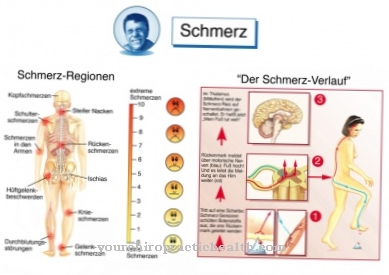nausea, queasy feeling or medical Nausea is a discomfort or symptom that is especially noticeable in the stomach area. Nausea is a common symptom and is not infrequently accompanied by vomiting or abdominal pain.
What is nausea?

Nausea is usually a sign of vomiting. However, the person affected does not always have to be forced to vomit. The feeling of nausea is induced in the vomiting center of the brain when special stimuli in the stomach have been stimulated beforehand.
Nausea is not uncommonly accompanied by other symptoms, such as fever, dizziness, headache, and sweating. The nausea is often preceded by or interacting with stomach pain, abdominal pain or gastrointestinal cramps.
Normally, nausea is harmless and goes away on its own after a few hours. However, if the nausea lasts longer (over several days), medical help should be sought immediately.
causes
Nausea can have many different causes. The most common cause is an overreaction of the stomach to poisonous substances that have been ingested through food. These poisons include moldy foods, toadstool (food poisoning), and alcohol (alcohol poisoning). In addition, pathogens such as bacteria can also cause nausea.
The feeling of nausea can also be triggered by the brain itself. This is often the case, for example, with motion sickness, metabolic disorders and pregnancy.
In addition to numerous diseases that can also cause nausea (see below), drugs, chemotherapy and anesthesia are also among the causes.
You can find your medication here
➔ Medicines against nausea and vomitingDiseases with this symptom
- Angina pectoris
- cholera
- Gastric ulcer
- Salmonella poisoning
- Enteritis
- Acute abdomen
- Alcohol poisoning
- abdominal influenza
- Alcohol intoxication
- gastritis
- Food poisoning
- Food intolerance
- flu
- typhus
- Stomach cancer
- Irritable stomach
- Duodenal ulcer
- Biliary colic
Diagnosis & course
As with other symptoms, the interplay of questioning and physical examination can provide the doctor with clues that will lead him to a correct diagnosis.
Questions about previous illnesses or possible triggers (alcohol, drugs) are necessary in order to be able to anticipate potential illnesses. Abdominal and bowel exams start the physical exams and should be accompanied by urine and blood tests. Computed tomography of the head and a gastroscopy are also possible.
The nausea usually shows itself in the course of an unpleasant feeling in the epigastric region. This is often described as a "queasy feeling". This is accompanied by a nausea that increases over time, which is the main characteristic of nausea.
Complications
Despite its function as a protective mechanism, nausea can lead to various complications. First of all, nausea irritates the gastrointestinal tract and often leads to other complaints such as diarrhea or constipation. In the long term, nausea increases the risk of inflammation in the stressed areas of the body. The nausea itself can also lead to stomach cramps, chills, and attacks of pain.
If vomiting occurs as a result of the nausea, this can result in a lack of fluids and nutrients such as electrolytes. The esophagus is also excessively irritated, which increases the risk of Mallory-Weiss syndrome or Boerhaave syndrome.
In the case of frequent nausea with vomiting, the teeth are damaged in addition to the pharynx. The transmission of pathogens is also a possible complication of nausea with vomiting. Acute nausea with vomiting can lead to aspiration and subsequently to respiratory insufficiency, i.e. chronic oxygen deficiency.
When treating nausea, home remedies and medication can initially make the symptoms worse. If the nausea is caused by a serious illness of the gastrointestinal tract, various complications can arise during a possible operation, always depending on the cause and the constitution of the patient.
When should you go to the doctor?
Nausea can occur for many different reasons. However, a doctor does not always have to be consulted immediately if the cause can be determined with a high degree of probability. However, if the nausea occurs repeatedly or over a very long period of time, you should definitely see a doctor. In such a case, the cause of the nausea should be found out by a doctor so that a serious underlying disease can be excluded.
In many cases, a gastrointestinal infection is responsible for severe nausea. Then there are also other clinical pictures, such as an increased temperature, vomiting and dizziness. If you have these symptoms, you should see a doctor as soon as possible. In such a case, a specialist can prescribe appropriate medication to alleviate the existing infection quickly and effectively. However, if you do not seek medication from a specialist, you are at great risk. The individual symptoms will possibly worsen considerably, so that a visit to the doctor is absolutely necessary.
So: Anyone who suffers from permanent nausea should definitely consult a doctor. This is the only way to identify the exact cause and any serious underlying disease at an early stage. Otherwise there may be an acute danger to life if treatment by a doctor is not given.
Doctors & therapists in your area
Treatment & Therapy
Nausea usually does not need treatment, as gluttony or too much alcohol is usually the cause of an upset stomach. The nausea will go away on its own after a few hours and usually does not require medical treatment.
However, if the nausea occurs over several days or as part of other symptoms of the disease, a doctor should be consulted. He will conduct a detailed survey, with particular emphasis on the duration and intensity of the nausea. The further examination then includes the physical diagnosis, during which bowel noises and stomach pain are examined more closely if necessary.
Diagnostics usually include a urine test and a blood test. An ultrasound examination and an electrocardiogram (EKG) can also be performed if you are sick. A gastroscopy and X-ray examination of the stomach and abdomen are also useful.
Outlook & forecast
In most cases, nausea does not need to be treated by a doctor. It often occurs only temporarily and then disappears on its own without any further complaints or complications. The nausea itself usually only occurs as an accompanying symptom of an illness, which is why the underlying illness should always be treated specifically.
It is advisable to consult a doctor if the symptom persists and cannot be associated with a specific illness.
If nausea occurs as a result of taking alcohol and other drugs, the symptom usually disappears on its own when the drug in question has been broken down by the body. Even with common flu or colds and diseases of the gastrointestinal tract, nausea and vomiting often occur. In these cases, medication can also be used to alleviate the symptom, as the patient's daily routine is severely restricted by the nausea. It is also not possible to do any physical activity or exercise.
If the symptom and the underlying disease are treated successfully, there are usually no further complications.
You can find your medication here
➔ Medicines against nausea and vomitingHome remedies & herbs for nausea
If the nausea is not caused by a disease, you can treat it yourself with herbs and home remedies. Above all, gastrointestinal teas made from peppermint or chamomile make a gentle contribution to recovery. Ginger products also have a positive effect on well-being when you are sick.
↳ More information: Home remedies for nausea
You can do that yourself
Nausea usually has harmless causes and can be treated effectively with the help of a few self-measures and home remedies. Teas made from sage, ginger or chamomile are especially helpful for digestive problems. In addition, irritating and spicy foods should be temporarily avoided in the event of nausea. Instead, we recommend foods that are gentle on the stomach, such as rusks and tea or pretzel sticks and cola.
Furthermore, those affected should make sure that they eat many, smaller meals, drink a lot throughout the day and keep their blood sugar levels stable. Those who suffer from nausea should also exercise a lot in the fresh air and make sure that their clothes are loose against the body. In the case of nausea during pregnancy, an iron deficiency can also be the cause, which can be remedied by taking appropriate preparations.
Alternative treatments such as aromatherapy or homeopathy can also help alleviate the symptoms. Sometimes even simple massages, a warm bath or preparations from the pharmacy can help against nausea. The nausea may also be due to an intolerance or allergy, which can best be determined with the help of a complaint diary. Depending on the cause, further treatment steps can then be determined together with the doctor.



























